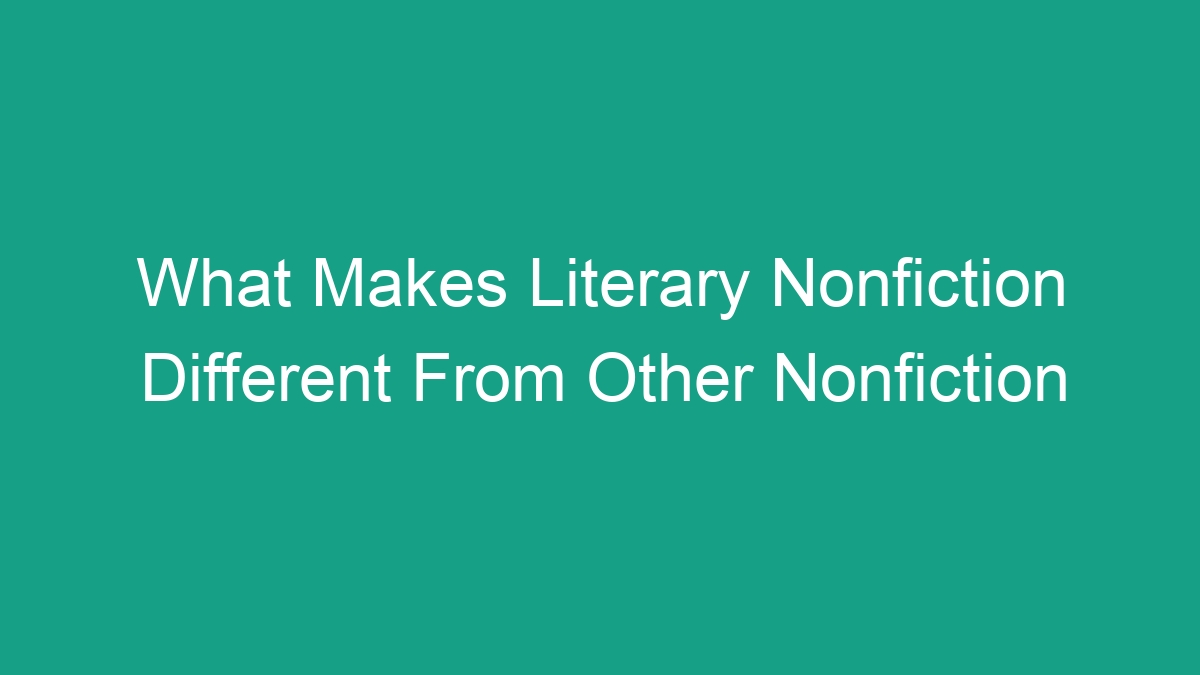
Literary nonfiction is a unique genre that sets itself apart from other forms of nonfiction writing. This article will explore the distinctive features of literary nonfiction and examine how it differs from other nonfiction genres.
Defining Literary Nonfiction
Literary nonfiction encompasses a wide range of writing, including memoirs, personal essays, and narrative journalism. It is a form of nonfiction that uses literary techniques to convey true stories and information. Literary nonfiction often prioritizes storytelling and narrative structure while still maintaining a commitment to representing facts and truth.
Emphasis on Storytelling
One of the main characteristics that differentiates literary nonfiction from other forms of nonfiction is its emphasis on storytelling. While traditional nonfiction may focus solely on presenting information in a straightforward manner, literary nonfiction incorporates elements of storytelling to engage readers on a deeper level. Authors of literary nonfiction may use descriptive language, vivid imagery, and character development to bring their narratives to life.
Exploring Personal Experience
Another distinguishing feature of literary nonfiction is its exploration of personal experience. Memoirs and personal essays are common forms of literary nonfiction that delve into the author’s own life and emotions. These works offer a unique and personal perspective on a particular subject, allowing readers to connect with the author on an emotional level. In contrast, other forms of nonfiction may prioritize a more objective and neutral presentation of information.
Use of Literary Devices
Literary nonfiction often makes use of literary devices such as metaphor, simile, and imagery to enhance the reading experience. These devices can add depth and complexity to the writing, making the narrative more engaging and memorable. By incorporating literary techniques, literary nonfiction elevates the storytelling aspect of nonfiction writing, blurring the line between factual reporting and creative expression.
Subjectivity and Reflection
Unlike traditional nonfiction, which typically presents information in an objective and straightforward manner, literary nonfiction allows for subjectivity and reflection. Authors of literary nonfiction often interweave their own thoughts, feelings, and interpretations into their writing, adding a personal touch that is not typically found in other nonfiction genres. This personalized approach can create a more intimate and relatable reading experience for audiences.
Blurring the Line Between Fact and Fiction
Literary nonfiction has the unique ability to blur the line between fact and fiction, incorporating elements of both to create compelling narratives. While the information presented in literary nonfiction is rooted in truth and reality, authors may use creative storytelling techniques to convey their message. This blending of fact and fiction can create a sense of authenticity and emotional resonance in literary nonfiction works.
Engaging the Reader Emotionally
One of the key distinctions of literary nonfiction is its ability to engage readers on an emotional level. By tapping into the author’s personal experiences and using literary techniques to convey a story, literary nonfiction can evoke a wide range of emotions in its audience. This emotional connection sets literary nonfiction apart from other forms of nonfiction, which may prioritize the dissemination of information over emotional resonance.
Examples of Literary Nonfiction
Some well-known examples of literary nonfiction include “The Year of Magical Thinking” by Joan Didion, “The Glass Castle” by Jeannette Walls, and “In Cold Blood” by Truman Capote. These works showcase the power of literary nonfiction to captivate audiences with compelling storytelling while still conveying important truths and real-life experiences.
Conclusion
In conclusion, literary nonfiction differs from other forms of nonfiction in its emphasis on storytelling, exploration of personal experience, use of literary devices, subjectivity and reflection, and its ability to blur the line between fact and fiction. The genre’s capacity to engage readers emotionally and create a deeper connection sets it apart from traditional nonfiction. As literary nonfiction continues to evolve and gain popularity, it remains an important and influential genre in the world of literature and nonfiction writing.



